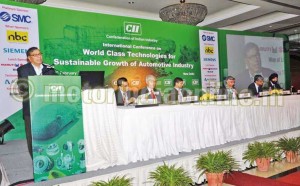
Adoption of innovative green technologies, cross-disciplinary vocational training and aggressive R&D can change the face of the Indian auto industry in the next decade. A strong collaboration between industry, the Government and academia is the key to provide the much-needed impetus to the auto sector which is passing through a sluggish phase.
Making this observation while addressing the CII International Conference on World Class Technologies for Sustainable Growth of Automotive Industry organised by the Confederation of Indian Industry (CII) in New Delhi, Mr. Ajay Shankar, Member Secretary, National Manufacturing Competitiveness Council (NMCC), expressed his view that the Indian auto sector is one of the major sectors accounting for 22 per cent of the country’s manufacturing GDP. Comprising passenger cars, two-wheelers, three-wheelers and commercial vehicles, it is the seventh largest in the world with an annual production of 17.5 million vehicles, of which 2.3 million are exported. “The Indian auto market has the potential to dominate the global auto industry, provided a conducive environment is created for potential innovators to come up with new pilot projects”.
Emphasizing the need for developing sustainable auto technologies, Mr. Shankar observed: “The coming century will be the century of smart cities where emissions will be zero and the carbon footprint will be nominal. So the Indian auto sector needs to aggressively focus on development of world-class smart vehicles. I call upon CII and its members to actively campaign and communicate the need, successes, ways and benefits of sustainable growth of automotive industry.”
Mr. Sunil Kant Munjal, CII past President, and Joint Managing Director, Hero MotoCorp Ltd., said: “Technology never works in isolation. So it is high time the Indian auto sector connected efficiently with Korean, Japanese and American markets to make a significant mark on the global map. There is a dire need of strong competitive corporate co-operation for development of innovative business models to attain holistic growth of the sector. Integrated multi-model transport system will be the future of the auto sector, so we need to establish world-class training institutes, with a cross-disciplinary approach. Focus of these institutes should be not only on development of relevant ideas but on development of pilots and patents.”
He also called upon women entrepreneurs to come forward and actively participate in the development process of the sector.
Suggesting a five-point agenda for revitalizing growth of the Indian auto sector, Dr. Wilfried Aulbur, Managing Partner, Roland Berger Strategy Consultants, the Knowledge Partner for the conference, said: “By the year 2050, 75 per cent of the world population will be urban, which directly inclines to the need of advanced mass transit system. In such a scenario, the auto industry around the world needs to follow a simple five-point agenda to revive its growth: Focus on R&D, development of international tie-ups between big and budding auto houses across the globe, evolution of light-weight vehicles, focus on zero-emission technologies, and sustainable production supply chain.”
Citing examples of Google and Apple, he said “the auto industry needs to adopt advanced business models and develop such vehicles that are pocket as well as environment-friendly.”
Expressing concern over the low expenditure on R&D in Indian auto sector, Mr. Harish Lakshman, President, ACMA, and Managing Director, Rane TRW Steering Systems, said: “Only one per cent of the sales revenue is spent on R&D in India, which is over 5 per cent in countries like Germany and Korea. This is quite evident to prove the fact that Research and Development has been ignored by the Indian auto sector.”
Referring to the challenges being faced by the Indian auto sector, he said: “On the one hand, the input cost is increasing and on the other demand for low-cost vehicles is on the rise. In such a situation, adoption of simple yet responsible corporate behaviour and upgradation of technologies is required. We must also focus aggressively on adoption of green technologies at each and every step of production-supply chain, so as to develop new improved eco-system. Further, the future of mobility will be marked by growth of light utility vehicles and mass transit. So, the auto industry needs to adopt advanced business models and develop such vehicles that are pocket as well as environment-friendly.”
Mr. Jayant Davar, Chairman, CII NR, and Managing Director, Sandhar Technologies Ltd., in his address, observed: “India is poised to be one of the fastest growing automotive markets worldwide over the next decade and to harness this opportunity, effective management of the short-term challenges, conducive environment for R&D, implementation of sustainable strategies and strong industry academia Government partnership are the keys. This conference proved to be an apt platform to chalk a roadmap for sustainable growth of the auto industry,”
He also laid emphasis on development of future generation vehicles that are not only based on the zero-emission concept but also focus on positive emissions to safeguard the environment.
A report “Automotive Landscape 2025”, prepared by CII and Roland Berger was also released on the occasion.
Experts from world’s leading vehicle and component manufacturers like Hero MotoCorp Ltd., FIAT Chrysler India, Mercedes-Benz, Maruti Suzuki India Ltd., Volkswagen India Pvt. Ltd., Mahindra & Mahindra Ltd., Siemens Industry Software (I) Pvt. Ltd., and Bosch, shared their experiences on different facets of recent technological advancements in the automobile industry with a view to making the Indian industry stronger, cost-effective and globally competitive.